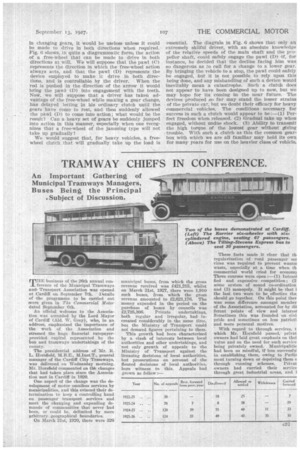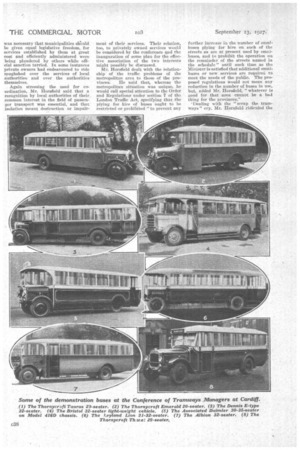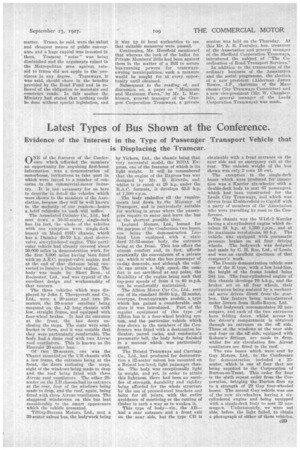TRAMWAY CHIEFS IN CONFERENCE.
Page 59

Page 60

Page 61

If you've noticed an error in this article please click here to report it so we can fix it.
MIDI.: business of the 26th annual con.1 fare nee of the Municipal Tramways andTransport Association was opened at Cardiff on September 7th. Details of the programme to be carried out were given in Tire Commercial Motor dated September 6th.
An official welcome to the Associa11011 was accorded by the Lord Mayor of Cardiff (Aid. IV. Grey), who, in an address, emphasized the importance of the work of the Association and stressed the huge financial ratepayerprovided capital represented by the bus and tramways undertakings of the county.
The presidential address of Mr. R. L. Horsfield, M.B.E., M,Inat.T:, general manager of the Cardiff City Tramways, was delivered on Wednesday morning. Mr. Horsfield cammented on tht changes that had taken place since the Association met in Cardiff in 1920.
One aspect of the change was the development of motor omnibus services by municipalities, and this evinced their determination to keep a controlling hand on passenger transport services and meet the changing and expanding demands of communities that never had been, or could be, delimited by mere arbitrary geographical boundaries.
On March 31st, 1020, there were 326
municipal buses, from which the gross revenue received was £421,215, whilst on March 31st, 1927, .there were 1,910 such buses, from which the gross revenue amounted to £2,621,176. The money expended in the period on the purchase of buses by councils was £2.725,366. Private undertakings, both regular and irregular, bad increaSed considerably in the same time, but the Ministry of Transport could not demand figures pertaining to them.
This growth had been characterized by a clash of interests between local authorities and other undertakings, and not only growth of appeals to the Ministry of Transport against the licensing decisions of local authorities, but prosecutions on account of the flouted decisions of local autherities, bore witness to this. Appeals had grown as follow:—
These facts made it clear that th, regularization of road passenger ser .vices was required to prevent wanton waste, especially at a time when tin commercial world cried for economy Three courses were open :—(1) Intensi Red and expensive competition; (2 some system of sound co-ordination and (3) monopoly. It might be that i the last two were to be effective the: should go together. On this point ther was some difference amongst member of the Association, accounted for by dif ferent points of view and interesi Sometimes this was founded on civi pride and sometimes on less patrioti and more personal motives.
'With regard to through services, t which Mr. Horsfield passed, privet owners had laid great emphasis on thei value and on the need for such service being privately owned. Municipalitie had been as mindful, if less successful in establishing them, owing to Parlie ment turning down or depriving them o through running schemes. Privat owners bad carried their service through great industrial areas, and was necessary that municipalities sliould be given equal legislative freedom, for services established by them at great cost and efficiently administered were being plundered by others while official sanction tarried. In some instances private owners had endeavoured to ride roughshod over the services of local authorities, and over the authorities themselves.
Again stressing the need for coordination, Mr. lIorafield said that a recognition by local authorities of their, common interest in the field of passenger transport was essential, and that isolation meant destruction or impah-
ment of their services. Their relation, too, to privately owned services would be considered by the conference and the inauguration of some plan for the effective association of the two interests might possibly be discussed.
Mr licirsfield dealt with the relationship of the traffic problems of the metropolitan area to those of the pro vince% He said that, whereas the metropolitan situation was unique, he would call special attention to the Order and Regulations under section 7 of the London Traffic Act, specifying that the plying for hire of buses ought to be restricted or prohibited "to prevent any further increase in the number of omnibuses plying for hire on such of the streets as arc at present used by omnibuses, and to prohibit the operation on the remainder of the streets named in the schedule" until snch time as the Minister is satisfied that additional omnibuses or new services are required to meet the needs of the public. The proposed regulations Would not mean any reduction in the number of buses in use, but, added Mr. Eforsficid, " whatever is good for that area cannot be a bad thing for the provinces."
'Dealing with the "scrap the tramways cry, Mr. Horsfield ridiculed the matter. Trams, he said, were the safest and cheapest means of public conveyance and a huge capital was invested in them. Tramcar "noise' was being diminished and the arguments raised in the Metropolitan area against rateaid to trams did not apply to the provinces in any degree. Tramways, it was said, sheuld share in the benefits provided by the Road Fund and he relieved of the obligation to maintain and construct roads. In this matter the Ministry had stated that nothing could be done without special legislation, and it iva.s lap ter' local authorities to see that suitable measures were passed.
Continuing, Mr. Horsfield mentioned that whereas the luck of the ballot for Private Members' Bills had been against them in the matter of .a Bill to secure bus-running powers for tramwaysowning municipalities, such a measure would be sought for at every opportunity until obtained.
Subsequent to the reading of, and discussion on, a paper on "Minimum and Maximum Fares," by Mr. L. Mackinnon, general manager of the Glasgow Corporation Tramways, a private session was held on the Thursday. At this Mr. A. R. Fearnley, hon. treasurer of the Association and general manager of the Sheffield Corporation Tramways, introduced the. subject of "The Coordination of Road Transport Services." , In addition to the transaction of the ordinary business of the Association and the social programme, the election of a new president (Alderman James Bowes, J.P., chairman of the Manchester City Tramways Committee) and a new vice-president (Mr. W. Chamberlain, general manager of the Leeds Corporation Trautways) was made.












































































































